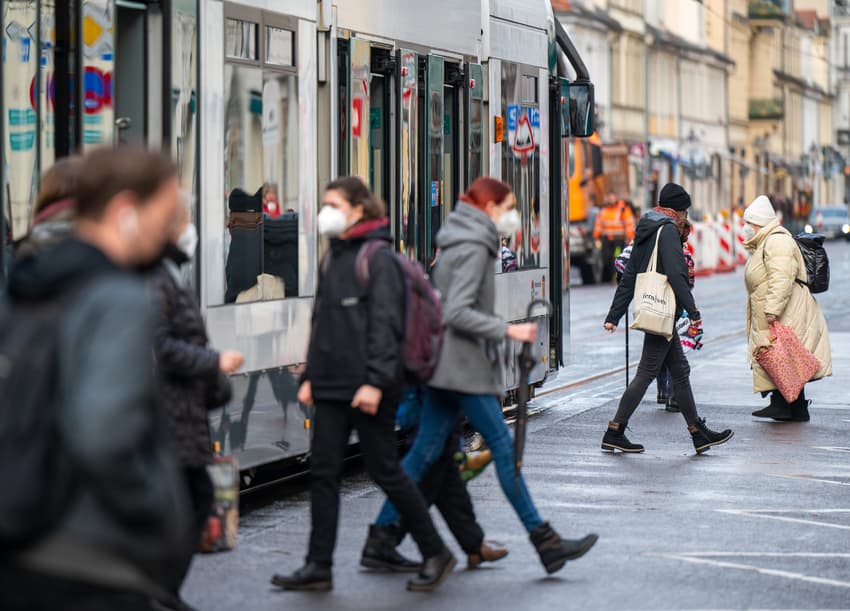When will Germany introduce the €9 monthly travel ticket?

The German government recently announced it was bringing in a relief package to ease the pain of rising energy costs, and it will include a €9 monthly travel ticket. When is it likely to come into force?
What's happening?
Germany wants to significantly reduce the cost of public travel in order to ease the pressure on households during the energy crisis.
As part of their energy relief package, the government, made up of a coalition between the Social Democrats (SPD), Greens and Free Democrats (FDP) has proposed a €9 per month travel ticket for a limited period of three months (costing €27 in total).
It would allow people to use their local bus, tram, U-Bahn and train network at a heavily discounted price - monthly travel tickets in Germany typically cost around €80 to €100.
Other measures include a €300 one-off payment to taxpayers, more support for struggling households and fuel tax cuts.
READ MORE: What Germany’s energy relief package means for you
When is this ticket coming?
Many people are eager to know when this travel ticket will come into force since it will make a massive difference to the lives of many, especially those struggling financially.
At the moment, details are still thin on the ground but more information is emerging.
On Friday Transport Minister Volker Wissing (FDP) said the ticket should be introduced by June 1st at the latest.
"We should not postpone it too much into the summer, because we want to give an incentive to save energy now, in the acute situation," said the FDP politician after a meeting with Hamburg's mayor Peter Tschentscher (SPD).
"By June 1st at the latest, I would say, it has to come."
During his visit to Schleswig-Holstein, however, Wissing signalled that the ticket could be implemented as early as May 1st. Earlier, a spokesman for his ministry had also said that Wissing believed introducing the ticket on May 1st was possible.
However, transport companies have proposed June as the better start date.
In a letter from the Association of German Transport Companies (Deutscher Verkehrsunternehmen or VDV) to Wissing, they stated that, following internal consultations, the industry considers a start date of June 1st for the discounted public transport ticket to be realistic - provided the relevant framework conditions are established in time.
READ ALSO: Where public transport costs are going up in Germany

People wait for an U-Bahn train in Munich. Photo: picture alliance/dpa | Sven Hoppe
'Field trial'
In Hamburg, Transport Minister Wissing said that the €9 ticket could also be used to evaluate customer flows and the future of transport in Germany.
He spoke of a "huge field trial" to find out how it would affect travel behaviour and how the discount would be accepted by people.
Wissing reiterated that he recommends offering the discount via an online ticket. "I don't think it makes sense to print extra tickets for this or to convert ticket machines," he said.
The cheap public transport ticket could also help to take a step forward in the digitalisation of systems. There are "not quite modern administrative structures in the area" of public transport, he said.
However, the transport association has suggested that tickets should be available at ticket machines because many passengers use them, especially older customers.
The operators also say there are still a lot of unanswered questions.
They want to know how the ticket will work for people who have different types of ticket subscriptions (known as Abos in Germany) with transport companies, and they say clear regulations from the government are needed.
It's also unclear if it would work in individual regions or be valid across Germany - for example, would customers be able to use it in Munich and Hamburg?
With its patchwork of local operators, Germany's public transport network and system of tariffs is complex, which could create headaches when it comes to implementing the new ticket.
The German central government has decided to cut the cost of public transport to 9€ for 3 months. But that's easier said than done since this is the map of local public transport authorities. https://t.co/f8pCfXtc1s
— Giulio Mattioli (@giulio_mattioli) March 25, 2022
According to a VDV spokesperson, the necessary political decisions are still pending.
As soon as they are available, the industry will need about four weeks to implement them. For instance, distribution systems would have to be adapted and customers informed.
"If we do not know where and for whom the ticket is to apply and when the funding for it will be available to the companies and associations, we cannot begin with the implementation," said the spokesperson, reported Zeit on Friday.
Comments
See Also
What's happening?
Germany wants to significantly reduce the cost of public travel in order to ease the pressure on households during the energy crisis.
As part of their energy relief package, the government, made up of a coalition between the Social Democrats (SPD), Greens and Free Democrats (FDP) has proposed a €9 per month travel ticket for a limited period of three months (costing €27 in total).
It would allow people to use their local bus, tram, U-Bahn and train network at a heavily discounted price - monthly travel tickets in Germany typically cost around €80 to €100.
Other measures include a €300 one-off payment to taxpayers, more support for struggling households and fuel tax cuts.
READ MORE: What Germany’s energy relief package means for you
When is this ticket coming?
Many people are eager to know when this travel ticket will come into force since it will make a massive difference to the lives of many, especially those struggling financially.
At the moment, details are still thin on the ground but more information is emerging.
On Friday Transport Minister Volker Wissing (FDP) said the ticket should be introduced by June 1st at the latest.
"We should not postpone it too much into the summer, because we want to give an incentive to save energy now, in the acute situation," said the FDP politician after a meeting with Hamburg's mayor Peter Tschentscher (SPD).
"By June 1st at the latest, I would say, it has to come."
During his visit to Schleswig-Holstein, however, Wissing signalled that the ticket could be implemented as early as May 1st. Earlier, a spokesman for his ministry had also said that Wissing believed introducing the ticket on May 1st was possible.
However, transport companies have proposed June as the better start date.
In a letter from the Association of German Transport Companies (Deutscher Verkehrsunternehmen or VDV) to Wissing, they stated that, following internal consultations, the industry considers a start date of June 1st for the discounted public transport ticket to be realistic - provided the relevant framework conditions are established in time.
READ ALSO: Where public transport costs are going up in Germany

'Field trial'
In Hamburg, Transport Minister Wissing said that the €9 ticket could also be used to evaluate customer flows and the future of transport in Germany.
He spoke of a "huge field trial" to find out how it would affect travel behaviour and how the discount would be accepted by people.
Wissing reiterated that he recommends offering the discount via an online ticket. "I don't think it makes sense to print extra tickets for this or to convert ticket machines," he said.
The cheap public transport ticket could also help to take a step forward in the digitalisation of systems. There are "not quite modern administrative structures in the area" of public transport, he said.
However, the transport association has suggested that tickets should be available at ticket machines because many passengers use them, especially older customers.
The operators also say there are still a lot of unanswered questions.
They want to know how the ticket will work for people who have different types of ticket subscriptions (known as Abos in Germany) with transport companies, and they say clear regulations from the government are needed.
It's also unclear if it would work in individual regions or be valid across Germany - for example, would customers be able to use it in Munich and Hamburg?
With its patchwork of local operators, Germany's public transport network and system of tariffs is complex, which could create headaches when it comes to implementing the new ticket.
The German central government has decided to cut the cost of public transport to 9€ for 3 months. But that's easier said than done since this is the map of local public transport authorities. https://t.co/f8pCfXtc1s
— Giulio Mattioli (@giulio_mattioli) March 25, 2022
According to a VDV spokesperson, the necessary political decisions are still pending.
As soon as they are available, the industry will need about four weeks to implement them. For instance, distribution systems would have to be adapted and customers informed.
"If we do not know where and for whom the ticket is to apply and when the funding for it will be available to the companies and associations, we cannot begin with the implementation," said the spokesperson, reported Zeit on Friday.
Join the conversation in our comments section below. Share your own views and experience and if you have a question or suggestion for our journalists then email us at [email protected].
Please keep comments civil, constructive and on topic – and make sure to read our terms of use before getting involved.
Please log in here to leave a comment.